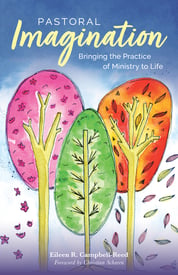
Not only has Eileen Campbell-Reed, author of Pastoral Imagination:Bringing the Practice of Ministry to Life, crafted her book as a resource for people in ministry, but she has also created a closely connected blog, podcast, video series, and journal. Each is part of her Three Minute Ministry Mentor initiative, through which she is empowering those in ministry to be the best versions of themselves in terms of both personal growth and professional development. With that in mind, here are some of the resources Eileen has created that we’d like to share with you.
Podcast
With three seasons complete and a fourth underway, the Three Minute Ministry Mentor podcast offers a wealth of information and thoughtful reflection for ministry professionals. We’ve picked out a few of our favorite episodes that you should give a listen to.
Permission to Grieve
This episode is part of a larger series on giving yourself permission to just be and to fully experience your emotions. Eileen reflects on the devastation of the pandemic, racism resulting in the deaths of Black and Brown people, and how to grieve when dealing with ambiguous loss.
Fearing Bravely
Eileen brings on a guest, Catherine McNiel, to discuss how we can fear bravely, choosing not to let our fear paralyze us but to use it as a tool to grow and live out courage and love.
Helping Pastors Thrive
Join Eileen and three new pastors to talk in-depth about her book Pastoral Imagination and how it has helped them face a multitude of challenges in their first years of ministry. The guests provide examples of situations in which they’ve consulted Pastoral Imagination and how they’ve found that this practical guide to being a pastor complements the theory they learned in seminary.
Blogs
A long-term blogger, Campbell-Reed has a host of blog posts covering topics like giving yourself permission to just be, trauma-informed leadership, celebrating Clergy Appreciation Month, and more! Here are a few of her posts that have resonated with us.
Pandemic Permission Project
The Pandemic Permission Project is a series of blog posts and podcasts meant to encourage and give us the space to do self-care and care for our communities.
Trauma Informed Leadership
Eileen writes about the impact of trauma, the outcomes of it, and how clergy leaders can begin to provide care to traumatized people.
How to Survive Zoom Fatigue
A guest blog by Phoebe Capps, focusing on how to combat Zoom fatigue and how she kept her youth group engaged. Capps also offers her thoughts on the value of flexibility during the pandemic and on creating a weekly event that the youth and ministers looked forward to despite it being virtual.
Book
Of course, we couldn’t end this collection of resources without highlighting Pastoral Imagination: Bringing the Practice of Ministry to Life.
In Pastoral Imagination: Bringing the Practice of Ministry to Life, Eileen R. Campbell-Reed informs and inspires the practice of ministry through slices of "on the ground" learning experienced by seminarians, pastors, activists, and chaplains and gathered from qualitative studies of ministry. Each of the fifty chapters explores a single concept through story, reflection, and provocative open-ended questions designed to spark conversation between ministers and mentors, among ministry peers, or for personal journal reflections. The book provides a framework for understanding ministry as an embodied, relational, integrative, and spiritual practice.
The book serves as a coaching guide and a ministry mentor in its own right by expanding on these topics through the author's reflections, observations, and questions. Addressing the importance of the practice of ministry, Campbell-Reed states: "Ministry itself, like most professions and complex practices, is dogged and driven by a rush to achieve. Yet to focus on achievement can be disastrous, especially if we skip over the steps for learning. To learn the practice of ministry—a multifaceted professional and spiritual practice—takes time and preparation, risk and responsibility, support and feedback."
The book can be used by individuals for personal growth; with groups in new-pastor retreats, CPE training programs, ministry peer groups, or supervision settings such as internship or field education; for devotional inspiration at staff meetings; and in seminary classrooms that prioritize teaching ministry as a practice.



